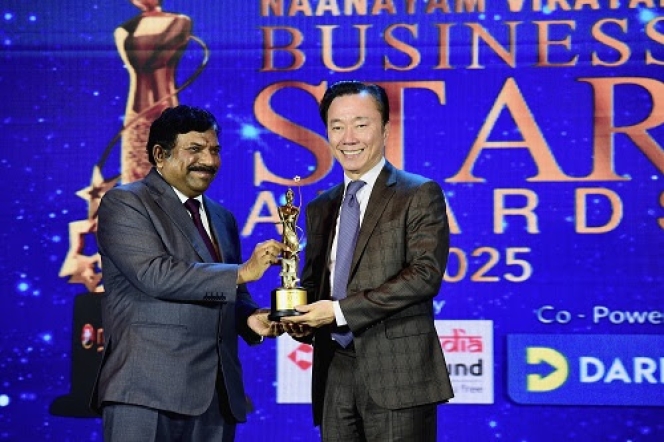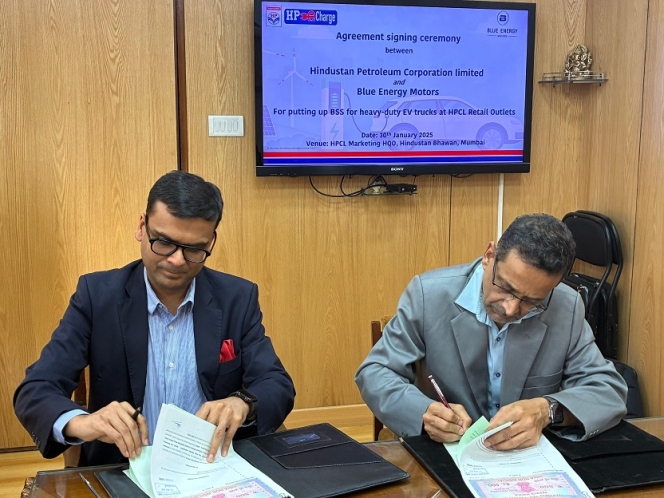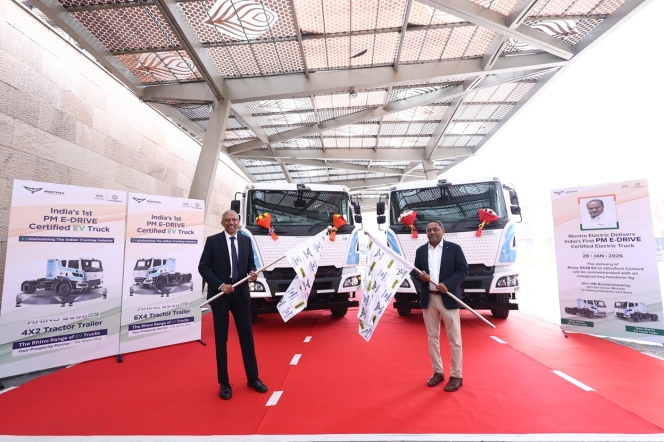
It is early afternoon as the Shatabdi train rolls into Amritsar from Delhi. An army of electric passenger three-wheelers greet the travellers as they come out the station and head to their respective destination. The other choice the travellers who have walked out of the station is the bigger diesel autorickshaws. Ironically, the diesel autorickshaws that can seat more passengers have been slowly making space for the electric three-wheelers because the latter are starting to make a more viable business case.
First is the ability of many to beat the higher entry barrier of diesel autorickshaws in terms of the acquisition price. The second is the running cost of a diesel rickshaws per day, which is more than that of an electric passenger three-wheeler. Third is the lower maintenance of an electric three-wheeler as compared to the that a diesel autorickshaw. Petrol or CNG autorickshaws are still not preferred in many Tier 2 and Tier 3 cities for reasons that are more on the side of perception than actual. The CNG autorickshaws especially have been known for their unreliable operation when the respective technology was just getting off the ground in the country.
Interestingly, the tiny streets and bylanes of Amritsar make a case for the seemingly punny electric passenger three-wheelers over their wider and mightier looking counterparts with IC engines. This is not just the case with Amritsar, which is one of the bigger cities in India, but with many other cities – smaller Tier 3 cities were earning potential and purchasing power is less. The electric passenger three-wheelers and electric cargo three-wheelers finding higher acceptance in smaller cities as they beat the conventional auto rickshaws in operating costs per day and per month, it should not come as a surprise that that electric vehicles have been witnessing a strong growth. The basis of operating costs per day and per month is driving a shift towards electric and hybrid vehicles in both the commercial and personal domain. In the personal vehicle domain, it is the electric two-wheelers that are leading the charge.
In 2022, they witnessed strong growth in India in particular – to the tune of a threefold sales increase almost. The official data for 2022 shows that Indians bought 27.8 billion EVs since January 2023 at an average of more than 90,000 EVs per month. Amit Bhatt, Managing Director for India, International Council of Clean Transportation (ICCT), expressed, “Smaller cities have the potential to become strong drivers of India's clean energy revolution. The adoption of EVs in these cities can reduce their carbon footprint and contribute to the ongoing nationwide efforts to combat air pollution and climate change. Transitioning to EVs in Tier-2 and Tier-3 cities will also help in lessening India’s dependence on fossil fuels, cutting down on import bills, and reducing air pollution. This shift will create a self-reliant and sustainable energy ecosystem that will contribute significantly to the country's economic growth.”
“The adoption of EVs in smaller cities will create new business opportunities and job opportunities in sectors such as manufacturing, supply chain, and charging infrastructure. This, in turn, will drive the economic growth and development of these regions. Wide-scale participation of Tier-2 and Tier-3 cities in India’s EV transition will help greatly in creating a greener nation. To ensure that this happens, it is essential to address challenges such as the lack of charging infrastructure; the need for greater awareness among consumers; and the need to develop local supply chains and manufacturing capabilities for EVs,” he added.
Sharif Qamar, Associate Director and Area Convenor, Transport and Urban Governance Division, The Energy and Resources Institute (TERI), reckoned, there are seven areas of focus for accelerating adoption of EVs across different geographies – institutional and policy readiness; infrastructure readiness; technology readiness; economic readiness; social readiness; environmental readiness; and innovation readiness.
“It is an incredibly steep technology curve that the industry has traversed in the past 6-7 years. This has enhanced the comfort, trust, and reliability of the EV ecosystem in the eyes of consumers, for all vehicle segments – three-wheelers, four-wheelers, buses, and small commercial vehicles – albeit at different levels. As the penetration of renewable energy in the power grid increases, the efficacy of EV technology in dealing with well-to-wheel emissions will be higher and its contribution to climate goals greater,” he explained.
As per the official estimates by ICCT, an ambitious vehicle electrification pathway – under which EVs could reach 95 percent of all new vehicle sales by 2040 – can help in reducing tailpipe emissions by 18-50 percent, depending on the pollutant. Other than the factor of operating costs, the rise in EVs in India is also influenced by central government incentives and policies, including the Faster Adoption and Manufacturing of (Hybrid &) Electric Vehicles scheme, state-level EV policies, declining costs of EV batteries, technology advancements and growing investments by domestic and international players in EV manufacturing and charging infrastructure.
Image source: @ImrajAhmed9
- VinFast
- Investor of the Year
- Urban Electric Vehicle of the Year
- VinFast VF 7
- Motor Vikatan Awards 2026
VinFast Wins Dual Honours In India For Investment And Electric SUV
- By MT Bureau
- January 31, 2026

VinFast’s strategic progress in India has been further validated through recent accolades from the influential Vikatan Group media network. The company was distinguished with two significant awards: one recognising its substantial investment commitment, and the other honouring its VF 7 model as the premier urban electric vehicle for 2026. These commendations underscore the brand’s deepening integration into the Indian automotive sector, highlighting both its industrial strategy and its product relevance.
The title of Investor of the Year, conferred by Nanayam Vikatan business magazine, specifically acknowledges VinFast’s landmark commitment to establishing an electric vehicle manufacturing facility in Thoothukudi, Tamil Nadu. This project is noted not only for its scale and strategic clarity but also for its anticipated role in fostering a new industrial corridor, generating employment and bolstering the local supplier network. It aligns with national initiatives like Make in India and reflects confidence in the region’s manufacturing potential.
Concurrently, the VF 7 electric SUV was named Urban Electric Vehicle of the Year at the Motor Vikatan Awards 2026. This recognition from automotive experts underscores the model’s successful adaptation to India’s urban driving conditions, balancing design, performance, safety and comfort. It serves as a testament to VinFast’s product development focus and its localisation strategy aimed at meeting specific market demands.
As a respected media institution in South India with a legacy dating to 1926, the Vikatan Group’s awards carry considerable weight among businesses and consumers. These latest honours add to a growing list of VinFast’s achievements in the market, illustrating the convergence of its investment, manufacturing, and product efforts. Within a short timeframe, the company has employed a long-term strategy encompassing manufacturing, retail, charging infrastructure and after-sales services. Through this comprehensive approach and a focus on sustainable innovation, VinFast is steadily building its brand presence while contributing to India’s transition towards green mobility.
Pham Sanh Chau, CEO, VinFast Asia, said, “Being recognised in two important award categories demonstrates how VinFast is steadily building its position in India, not only through long term investment commitments but also through products developed to match local conditions and user needs. This recognition provides further momentum for us to accelerate implementation, expand the electric vehicle ecosystem, and maintain a long-term partnership with the Indian market.”
B Srinivasan, CEO, Vikatan Group, said, “VinFast India represents the new-age investor – bold in vision, swift in execution and deeply aligned with India’s growth story. By unravelling the true potential of the port city of Thoothukudi, VinFast India has helped create a conducive industrial ecosystem, played a positive role in employment generation and restored the city’s importance on India’s manufacturing map. Their investment is not just capital at work but confidence in India’s future.”
Blue Energy Motors And HPCL Forge Nationwide Pact For Electric Truck Battery Swapping
- By MT Bureau
- January 30, 2026

Blue Energy Motors and Hindustan Petroleum Corporation Limited (HPCL) have entered a strategic partnership to deploy Battery Swapping Stations for electric commercial trucks at select HPCL fuel outlets nationwide. This initiative leverages HPCL’s extensive network of over 24,400 retail locations to create a widespread and convenient energy infrastructure for freight operators. By situating swap stations within established fuelling hubs, the collaboration seeks to make electric mobility a practical and scalable reality for India’s logistics sector.
The core advantage of battery swapping lies in its dramatic reduction of energy replenishment time to under five minutes, minimising vehicle downtime compared to conventional charging. For fleet operators, this efficiency translates into higher vehicle utilisation, improved productivity and more predictable scheduling. Furthermore, a growing and accessible network of swap stations alleviates range anxiety, enabling electric heavy-duty trucks to confidently undertake longer routes and multiple shifts.
As India advances its green transportation goals, this alliance holds significant strategic value. HPCL’s vast retail footprint, which already supports over 5,400 EV charging points under its HP e-Charge brand, offers a ready platform for rapid infrastructure deployment across key freight corridors. Blue Energy Motors, a pioneer in zero-emission freight solutions, brings its expertise in electric commercial vehicles, exemplified by its launch of India’s first electric freight corridor. Together, the companies aim to accelerate electric vehicle adoption by directly addressing the operational needs of commercial fleets, thereby strengthening the long-term development of sustainable freight transport in the country.
- Eicher Trucks and Buses
- VE Commercial Vehicles
- VECV
- India Book of Records
- IBR
- Eicher Pro X
- Vinod Aggarwal
- SS Gill
- Abhishek Chaudhary
Eicher Pro X EV Completes Kashmir To Kanyakumari Journey In 6 Days
- By MT Bureau
- January 28, 2026

Eicher Trucks and Buses, part of VE Commercial Vehicles (VECV), has completed a journey from Kashmir to Kanyakumari using its Eicher Pro X EV.
The record verified by the India Book of Records (IBR), saw the electric vehicle cover over 4,000 kilometres in 6 days under loaded conditions. The run commenced in Srinagar on 20 January 2026 and concluded in Kanyakumari on 26 January 2026, traversing the Himalayas, plains and the Deccan Plateau.
Throughout the expedition, the vehicle utilised public chargers located via the MyEicher App. An adjudicator from the India Book of Records accompanied the truck to monitor route compliance, load, distance and charging stops. The mission served as a demonstration of electric vehicle endurance across diverse altitudes and climates to validate the technology for logistics corridors.
The journey was intended to show that electric commercial vehicles can operate beyond short-haul deliveries. By maintaining performance across hilly and coastal routes, the Pro X EV aimed to establish total cost of ownership (TCO) benefits and maintenance predictability for fleet operators. The successful completion of the route suggests that current charging infrastructure can support long-haul electric freight movement.
Vinod Aggarwal, MD & CEO, VE Commercial Vehicles, said, “For more than four decades, Eicher trucks and Buses have earned customer trust through leadership in fuel efficiency and application-specific engineering. The record-setting performance of the Eicher Pro X reinforces our unwavering focus on application excellence, reliability, and performance, anchored in robust product development and manufacturing capabilities, and enabled by a customer-centric, pan-India commercial and dealer network. I commend the entire Eicher team for achieving these well-deserved records”.
SS Gill, Chief Commercial Officer, VE Commercial Vehicles, said, “By covering the K2K route with a loaded Pro X EV, Eicher Trucks & Buses has proven that electric mobility is no longer restricted to short-haul, ‘last-mile’ deliveries. We are not just setting records, but through the strength of our service network and extensive dealer set-up, we are demonstrating that our EV technology is commercially viable, reliable, and has the range to serve as the backbone of India’s green logistics corridors”.
Abhishek Chaudhary, SVP – SCV Sales & Marketing, VE Commercial Vehicles, said, “The Eicher Pro X EV was put to the ultimate test – covering over 4000 kilometres across diverse climates and challenging altitudes. With this recognition from the India Book of Records we’ve moved beyond our own stringent testing benchmarks to real-world validation - Demonstrating that Eicher Pro X EV is a dependable partner for logistics movement across varied operations in India”.
- Montra Electric
- Murugappa Group
- PM E-Drive Scheme
- Rhino 5538 EV 6x4 Tractor trailer
- Narendra Modi
- H D Kumaraswamy
- Arun Murguappan
- Sathia Raj
- UltraTech Cement
Montra Electric Becomes First OEM To Receive PM E-Drive Certification For Heavy Trucks
- By MT Bureau
- January 28, 2026

Montra Electric, the electric medium and heavy commercial vehicle business of the Murugappa Group, has become the first manufacturer in India to receive certification for heavy-duty electric trucks under the government's PM E-Drive Scheme.
To mark the achievement, the company delivered a Rhino 5538 EV 6x4 Tractor trailer to UltraTech Cement. The handover took place in the presence of Arun Murugappan, Chairman of Montra Electric and Sathia Raj, Chief Procurement Officer of UltraTech Cement.
The PM E-Drive scheme includes a budget of INR 5 billion specifically for electric trucks, providing a benefit of up to INR 960,000 per vehicle for the Rhino 5538 EV. This incentive is intended to lower operating costs and reduce exposure to fuel price volatility for fleet operators in the logistics, mining, and manufacturing sectors. The Rhino 5538 EV range is designed for Indian conditions and is available in 6x4 and 4x2 variants.
The Rhino 5538 EV 4x2 variant features a 282 kWh LFP battery that produces 380 HP and 2000 Nm of torque. It offers a range of approximately 198 km under standard test conditions and supports six-minute battery swaps. These specifications suit the vehicle for high-utilisation applications in ports, steel plants, and cement logistics.
H D Kumaraswamy, Union Minister for Heavy Industries, said, "The PM E-Drive scheme is a testament to the growing prowess of Indian innovation in the heavy-duty electric vehicle segment. Under the visionary leadership of Prime Minister Narendra Modi, we are committed to decarbonizing our logistics and making India a global hub for EV manufacturing. Electric trucks are pivotal to our Net Zero goals, and by fostering a self-reliant ecosystem through such certifications, we are driving the spirit of Atmanirbhar Viksit Bharat. We are very happy to see our Prime Minister’s vision coming to life with the 1st PM E-Drive certified heavy duty electric truck from 'Montra Electric' getting delivered today."
Arun Murugappan, Chairman, Montra Electric, said: “Decarbonising freight is one of the most critical challenges in India’s energy transition. We are grateful to the Government of India and our Prime Minister Narendra Modi for introducing forward-looking and progressive policy frameworks such as the PM E-Drive Scheme, which represent a welcome and transformative step in accelerating this shift, particularly in heavy commercial vehicles where emissions intensity is high. At Montra Electric, we are proud to contribute to this national mission by delivering technologically advanced, reliable, and scalable electric M&HCV solutions that can drive meaningful and lasting change in India’s mobility ecosystem.”








Comments (0)
ADD COMMENT